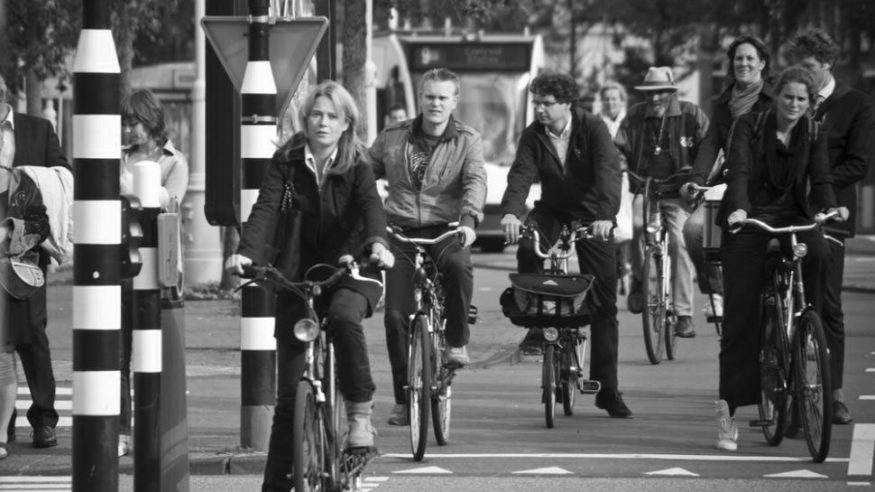“I hate cyclists!”
21 August 2023
True story: a friend who works for the NHS had to attend mandatory RESPECT training. The workshop convenor started the day with ice breakers, everyone was invited to say what they liked and disliked. He received answers like teapots, cheese and so on before confessing, “I hate cyclists!” He elaborated this theme before encouraging everyone to watch a video, recently circulating on social media, of a car driver pushing a cyclist off the road. I’ve seen the video he talked about, and many like it, but as someone who rides a bike for transport and leisure, it provoked a very different reaction in me to him. I regularly feel threatened by people driving cars, either indirectly through their culpable inattentiveness or directly through their occasional malice. The reprimanding horn, angry shout, or intentional close pass because, essentially, they resent sharing the road with me when I am on my bike.
A possible explanation of such behaviours is that the roads are getting ever more crowded with 40.8 million registered vehicles on UK roads in 2022.[1] It is hard for people to get about by car, so when driving a car people are prone to resent anyone slowing them down. But while this might explain some instances of anger, it doesn’t account for all. The anger directed towards me when I cycle my bike does not correlate with my impeding the flow of traffic, which I rarely in fact do, and I rarely witness anger when I add to the traffic by driving my car. Rather, the anger is directed at me qua cyclist, which is what I become when I get on my bike. Somehow a means of transport and leisure has been dragged into the culture wars. Alongside low traffic neighbourhoods and fifteen-minute cities, cyclists are something that people commonly get angry about. The ordinariness of this is shown by the fact that the convenor of my friend’s RESPECT workshop – the irony – felt it was socially acceptable to confess to hating to cyclists, and indeed expected others to share his anger!
As a philosopher, with a particular interest in epistemology, one question that interests me is why people believe the tissue of falsehoods – that cyclists don’t pay road tax, jump every red light, think they own the road etc. – that sustain this anger? The answer, I think, lies, in part but crucially, in the ways that social media has shaped information communication, where it is this shaping that has then facilitated the culture wars. To elaborate what I mean by this consider what happens when face-to-face communication becomes mediated by social media. Start with a face-to-face conversation you are having with a friend, where the friend tells you something. In this situation – faced with your friend’s testimony, as epistemologists are wont to say – there are, I think, two general ways in which you might respond. We might call these the trusting and critical responses. To respond with trust is to believe your friend; it is to see her as informing you of something. This is the way conversations ordinarily proceed: we tell things expecting to be believed, and in responding to another’s telling with trust we credit them with informing us about something. But occasionally we are more critical, we might worry that the friend does not really know what she is talking about or has somehow got things wrong. In this case, we start to weigh the evidence – her credentials against what we otherwise know to be the case – and maybe we reject what she says or end up believing it but do so now because we’ve reached our own judgement. It’s worth noting here that these two ways of responding to a conversation are quite general: think how you might react to someone’s reprimand. You could take it in the spirit it is given and apologise, or discern a mistake and seek to explain it away. The first response is participatory, the second a shift to a more objective mode.
Now apply this to a ‘conversation’ mediated by social media. You confront a friend’s testimony, not face-to-face, by in the medium of an online post or tweet. Again, you might respond with trust or critically, but both responses, I think, become problematic now the ‘conversation’ has shifted online. First, social media users tend to retweet or repost items that pique their interest without too much scrutiny of their epistemic credentials. For instance, my true story is genuine, but were it an online post, it might be circulated by people who have no idea whether it is true or not. However, to trust a friend’s post is to presume both that it is true, and that they take responsibility for its being so. This presumption, which largely holds in face-to-face conversations is more likely to fail in online interactions. This was clearly witnessed with Trump’s excuse, when accused of propagating fake statistics, that he was merely re-tweeting. The norms of trust and accountability just haven’t caught up here (Rini 2017).
Second, to respond critically and weigh the truth of the friend’s post then requires that we have the epistemic resources to do this. Often we do. But a problem is that as our sources of information are increasingly dominated by social media, the algorithms that shape these sources to our interests impoverish our epistemic resources. For example, just as my twitter feed fills up with pollution statistics, LTN greatness and bike racing, I imagine the workshop convenor’s feed fills up with tales of cyclist entitlement, bad behaviour and deserved punishment. That is, social media algorithms shape interests into filter bubbles (Pariser 2011), which, to the extent that our informational sources are dominated by social media, then become epistemic bubbles (Nguyen 2020). To be in an epistemic bubble is to have a reduced capacity to critically assess. These two points, of course, require much elaboration and defence. So far they are only suggestions as to how our epistemic responses to testimony can start to go awry when the testimony shifts online. And this is the beginnings of an explanation as to why people can believe the most conspicuous falsehoods.
If this were an academic paper, the next thing to note would be that insofar as our responses to online posts mirror our responses to offline tellings, the beliefs we form will, in both cases, largely be rational. That is, insofar as belief is formed on trust or through critical reflection, all be it against an impoverished background, it will be reasonably held. People might get things wrong, but that is just the epistemic environment they swim in. You change this situation, in my view, by changing this epistemic environment, not by requiring people to be smarter or educate themselves. This is a matter of government intervention and legislation, in the same way, as history has shown, you stop people smoking by changing their social environment through legislation, not by encouraging them to have more will power. The thorny issue is then how to implement legislation that doesn’t contravene freedom of speech. One idea, for example, is to implement a scoring system sensitive to whether a user has propagated known falsehoods (see Rini 2017). But on the roads, it’s not the rationality, or not, of car drivers that is an issue for me. Or even the system that supports their false beliefs. What is an issue is that, in their anger, they seem to forget that they can easily kill me. What bothers me is that this culture war is one that could end with my blood on the road.
Nguyen, C. T. (2020). “Echo Chambers and Epistemic Bubbles.” Episteme 17(2): 141-161.
Pariser, E. (2011). The Filter Bubble: What the Internet Is Hiding From You. London, Penguin UK.
Rini, R. (2017). “Fakes News and Partisan Epistemology.” Kennedy Institute of Ethics Journal 27(S1): 43-64.
[1] https://www.gov.uk/government/statistics/vehicle-licensing-statistics-july-to-september-2022/vehicle-licensing-statistics-july-to-september-2022 (accessed 16/6/23).
Comments
1 comment
Comments are closed.
- December 2024
- November 2024
- October 2024
- September 2024
- August 2024
- July 2024
- June 2024
- May 2024
- April 2024
- March 2024
- February 2024
- January 2024
- December 2023
- November 2023
- October 2023
- September 2023
- August 2023
- July 2023
- June 2023
- May 2023
- April 2023
- March 2023
- February 2023
- January 2023
- December 2022
- November 2022
- October 2022
- September 2022
- August 2022
- July 2022
- June 2022
- May 2022
- April 2022
- March 2022
- February 2022
- January 2022
- December 2021
- November 2021
- October 2021
- September 2021
- August 2021
- July 2021
- June 2021
- May 2021
- April 2021
- March 2021
- February 2021
- January 2021
- December 2020
- November 2020
- October 2020
- September 2020
- August 2020
- July 2020
- June 2020
- May 2020
- April 2020
- March 2020
- February 2020
- January 2020
- December 2019
- November 2019
- October 2019
- September 2019
- August 2019
- July 2019
- June 2019
- May 2019
- April 2019
- March 2019
- February 2019
- January 2019
- December 2018
- November 2018
- October 2018
- September 2018
- August 2018
- July 2018
- June 2018
- May 2018
- April 2018
- March 2018
- February 2018
- January 2018
- December 2017
- November 2017
- October 2017
- September 2017
- August 2017
- July 2017
- June 2017
- May 2017


Nice. But wasn’t there a similar attitude to cyclists (rage and ‘other-ing’) 20 years ago before the Twitterstorms? Cheers, Bruno